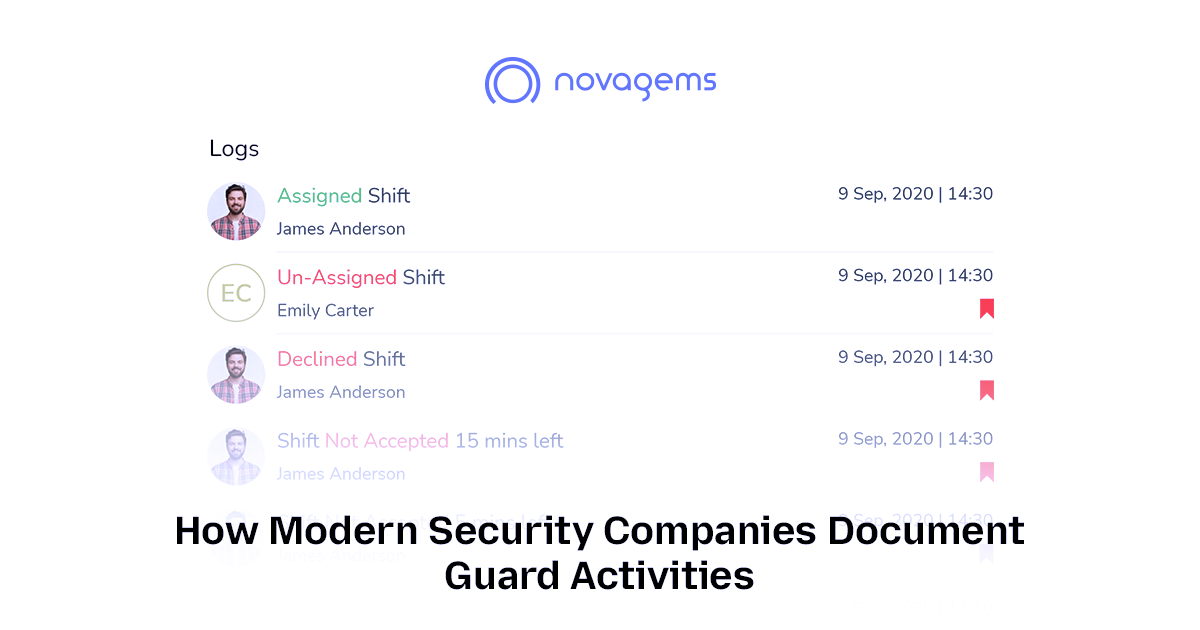How Security Officers Stay Fit on Duty
Published on: Wed, Nov 12, 2025
Read in 7 minutes

Key Takeaways
- The backbone of every great security officer’s performance is good fitness and physical health; you can’t protect others when your body can’t keep up.
- The job requires strength, endurance, and alertness-all of which come from smart, consistent exercise and fitness routines.
- The little things in life count: more walking, stretching frequently, and eating appropriately make all the difference in extended shifts.
- Technology helps: Smartwatches and tools such as Novagems track movement, recovery, and workload to keep guards healthier and more effective.
- Team-based wellness programs build morale, reduce turnover, and make every shift safer for guards and clients alike.
Why Fitness Matters for Security Officers
When you wear a uniform and carry the responsibility of keeping people and property safe, you’re not just showing up for a job-you’re stepping into a role that demands focus, composure, and stamina. And those qualities begin with one foundation: fitness.
Security personnel are the ones who generally act first in cases of disturbance, helping in distress, or even when there is an imminent threat. In those instants, physical preparation may make all the difference between orderly control and utter chaos.
Good fitness doesn’t just build muscle; it builds confidence. It gives officers the strength to stand their ground and the endurance to stay sharp through long, unpredictable shifts.
According to the Bureau of Labor Statistics, security officers have one of the highest rates of physical strain among service jobs due to prolonged standing and unpredictable physical demands. That means keeping your body strong isn’t optional-it’s essential for safety, performance, and peace of mind.
The Real Benefits of Staying Fit on Duty
- Sharper Alertness: Regular movement keeps blood flowing and the mind clear, improving situational awareness.
- Reduced fatigue: Fit guards show fewer signs of aches, cramps, and drops in focus during late-night or extended shifts.
- Emotional stability: Exercise releases endorphins-nature’s stress relievers-which become important whenever your line of work involves being vigilant nonstop.
- Faster Response Time: A fit body reacts faster under pressure, helping to prevent escalation before it happens.
Think of it like this: a security officer’s most valuable tool isn’t a flashlight, a radio, or even a badge - it’s his or her own body.
The Physical Demands of Security Work
Too many people underestimate what security guards go through on a single shift. It’s not just “standing around”; rather, it’s a mix of stillness and action, patience and preparedness.
Let’s break down what makes the job so demanding:
1. Long Hours, Little Movement
Whether you’re stationed at a gate, a corporate lobby, or a warehouse, many posts require hours of standing. Without movement, your legs swell, circulation slows, and fatigue sets in. Over time, this affects posture, concentration, and even morale.
2. Quick Responses While Under Stress
When an incident breaks out, guards need to act fast. That could mean running, climbing stairs, or physically intervening. These movements require cardiovascular endurance, core strength, and mobility-not just brute force.
3. Night Shifts and Sleep Disruption
Security work involves many instances of rotational or night shifts. Poor sleep reduces recovery, weakens immunity, and affects mood. Exercise, proper diet, and hydration will help the body adapt to these irregular cycles.
4. Stress on Mind and Body
Every police officer knows that mental fatigue can hit harder than physical tiredness. Keeping awake for 10 or 12 hours, scanning surroundings, and being “ready” at all times is mentally draining. Physical fitness keeps the mind resilient and energy steady.
The bottom line? The job itself is an endurance test — and how well you perform depends upon your exercise and fitness routine.
Fitness Tips for Security Officers on Duty
Now, let’s get practical: one doesn’t need fancy equipment or a gym membership to stay fit as a security guard; all one needs is consistency and a few smart strategies that fit your daily rhythm.
1. Walk Whenever You Can
If your post permits, take short walking breaks. Even a few hundred extra steps every hour add up. Walking improves circulation, keeps muscles active, and boosts focus.
Tip: For those who use smartwatches or phone trackers, try to hit at least 7,000–10,000 steps in a day, even on static shifts.
2. Use “Micro Workouts”
A five-minute burst of bodyweight exercises during breaks can do wonders. Try:
- 10 squats
- 10 push-ups
- 20 jumping jacks
- 30-second plank
Repeat twice. That’s under 10 minutes, no gym, and no excuses.
3. Stretch to Stay Strong
Static posts give stiffness to the back and legs. Gentle stretching every 2–3 hours improves flexibility and helps avoid pain. Shoulder rolls, calf raises, and torso twists can be done in uniform.
4. Stay Hydrated & Eat Smart
Skipping meals or relying on energy drinks can ruin stamina. Carry water, healthy snacks-nuts, fruits, and yogurt, and avoid heavy, greasy meals prior to shifts. Balanced nutrition fuels focus and endurance.
5. Prioritize Rest and Recovery
Sleep isn’t downtime, but repair time. Night guards should try to get consistent rest, even if it is split. Utilize blackout curtains or eye masks to simulate darkness during rest periods in the day.
The Role of Technology in Monitoring Fitness
Wearable fitness technology is changing the game for security professionals. Smartwatches and fitness trackers monitor steps, heart rate, sleep, and even stress, providing immediate feedback to guards on their physical health.
More importantly, security companies can now integrate this data with guard management tools like Novagems to get a complete picture of both operational and personal well-being.
Imagine this:
A new system furnishes the manager with real-time data when a guard has been stationary for 3+ hours wellness check is in order.
Another guard’s wearable shows low recovery rates-a cue to adjust shift timing.
This blend of tech and humanity prevents burnout and builds a culture of care.
In fact, Forbes Health lists workplace wellness tech as one of the top 5 trends in corporate performance for 2025 (Forbes.com). Security teams embracing these tools aren’t just managing shifts; they are protecting their most valuable resource: their people.
Building a Fitness Program for Your Team
But if you manage a security company or a multisite environment, building a culture of fitness may be one of the most prudent investments available to you.
1. Begin with Awareness
Start all new hire orientations with a short session regarding fitness for security guards: why it is important and how that relates to safety.
2. Lead by Example
When supervisors or site leads take wellness seriously, so do the rest of the team. Simple encouragement like, “Hey, take your walk break,” can make a real difference.
3. Build Small but Structured Routines
- Design simple, scalable programs that fit your operations.
- Morning stretches before deployment
- End-of-shift mobility routines
- Optional “weekly step challenge” among teams
4. Tracking and Reward
Log participation through Novagems or fitness tracking apps. Reinforce consistency, either with a $10 coffee card, a wellness badge, public recognition, or other accolades.
5. Make It Part of Company DNA
Talk about fitness as a safety measure, not a perk. When fitness is part of your culture, retention improves and injury claims go down.
Final Thoughts
Maintaining physical fitness on the job is one of the most intelligent professional investments that any security officer can make. This is not about six-packs or marathon medals; it’s readiness. When you are strong, rested, and alert, you’re safer, faster, and more effective at the job.
With tools like Novagems, fitness and duty can finally go hand-in-hand: tracking guard performance, safety, and well-being all in one place. Remember, the best security officers don’t just protect-they prepare. So move more, eat better, sleep well, and stay fit. When you are at your best, everyone you protect is safer too.
Frequently Asked Questions
Q1. Why is fitness important for security officers?
Because your body is part of your toolkit. Staying fit helps guards respond faster, think clearly, and maintain stamina through long shifts.
Q2. Is it possible to stay fit without going to the gym?
Absolutely, one can make do with walking, stretching, and bodyweight exercises during breaks to remain fit enough.
Q3. How does staying fit affect job performance?
Fit guards experience fewer injuries, recover faster from fatigue, and perform more efficiently — leading to better client satisfaction.
Q4. How can technology help with staying fit on duty?
Wearable tech tracks health metrics, while integrated platforms like Novagems can connect that data with shift and patrol analytics for a holistic approach.
Q5. How can companies best promote the fitness of guards?
Start small: a daily movement challenge, a fitness leaderboard, or a monthly wellness reward program. Consistency will always beat intensity.
Get a Free Trial
Sign up For Newsletter
Latest Blog Posts
Get Started
Start being productive & grow your business
with Novagems





